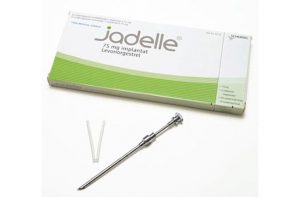FOR 2017, more than 300 women have opted to use, Jadelle, a contraceptive implant as against other contraceptives being offered here in Guyana.
Jadelle was introduced to Guyana through the Public Health Ministry’s Maternal and Child Health Department (MCH) in November 2016, and according to the MCH Director, Dr. Ertenisa Hamilton, though the numbers of recipients are slowly climbing, it is catching on.
The long-acting, reversible contraception for women, which goes by the brand name, Jadelle (levonorgestrel), is an implant, which when placed under the skin of the upper arm slowly releases a hormone called progestogen that prevents pregnancy. For a period of five years, the implants can stop the body from releasing an egg each month, while thickening the mucus in the cervix so as to prevent sperm from travelling to the egg.
During a recent interview with Guyana Chronicle, Dr. Hamilton said MCH has been training medical personnel on the use of the implant. Regions One (Barima-Waini), Region Two (Pomeroon-Supenaam) and Region Nine (UpperTakutu-Upper Essequibo) are among the administrative regions being targeted with outreaches already planned for those areas.
“So everywhere we would have trained the personnel, we are going to do continuous work with them,” Dr. Hamilton posited, while adding that implants will also be offered during those visits.
It was noted that the contraceptive implant is also being offered at the Georgetown Public Hospital (GPHC), however, appointments are required.

“And at the Georgetown Public Hospital they have special dates, that if you are interested, they will tell you to book your date, and then they will call you to get it done,” she explained.
Noting that more than 300 women have taken the implant already for the year, Dr. Hamilton said though the numbers are small, women are also capitalising on other contraceptives.
CATCHING ON
“It’s slow but its catching on because remember now, the actual process that we are doing, is that when you are coming to do your family planning, we give you the explanation for all that we have available so that you make your selection within the counselling session,” she explained.
The Jadelle Implant system was developed in the 1980s by The Population Council and had succeeded Norplant – the first implantable hormone delivery system developed by The Population Council.
The implant is more than 99 per cent effective in preventing pregnancy.
In addition to the newly introduced Jadelle, there are a number of other contraceptives available in Guyana, such as the oral contraceptives, injectable birth control method mainly Depo-Provera and Noristerat, in addition to the Intra-uterine Device (IUD) which is also a long-term reversible contraceptive. Condoms are also widely used in Guyana; however, if not used correctly, pregnancy can occur.
Similarly, if the birth control pills and injectables are not used correctly, pregnancy can occur as well.
However, in the case of Jadelle, if a woman is desirous of becoming pregnant within the period of five years, the implant can be easily removed. Once pregnant, the implant is advised against. However, if rods were inserted beneath the skin, and it was subsequently discovered that a woman is pregnant, they are removed, with no effect on the baby or mother.
During the counselling sessions, women who have breast cancer or experience hypertension would be advised not to do the implant. It is during the counselling sessions too that patients are informed of the side effects of Jadelle, which include irregular bleeding and no bleeding.
Of the estimated 211 million pregnancies that occur worldwide on an annual basis, 87 million are unintended; 46 million of which end in induced abortions.
Of the 46 million abortions, approximately 21.6 million are unsafe and at the end of each year, it is further estimated that 47, 000 women die from complications of unsafe abortions.
According to the Center for Disease Control and Prevention, the high number of unintended pregnancies is directly linked to the unmet need for contraception (birth control) and family planning.



.jpg)











